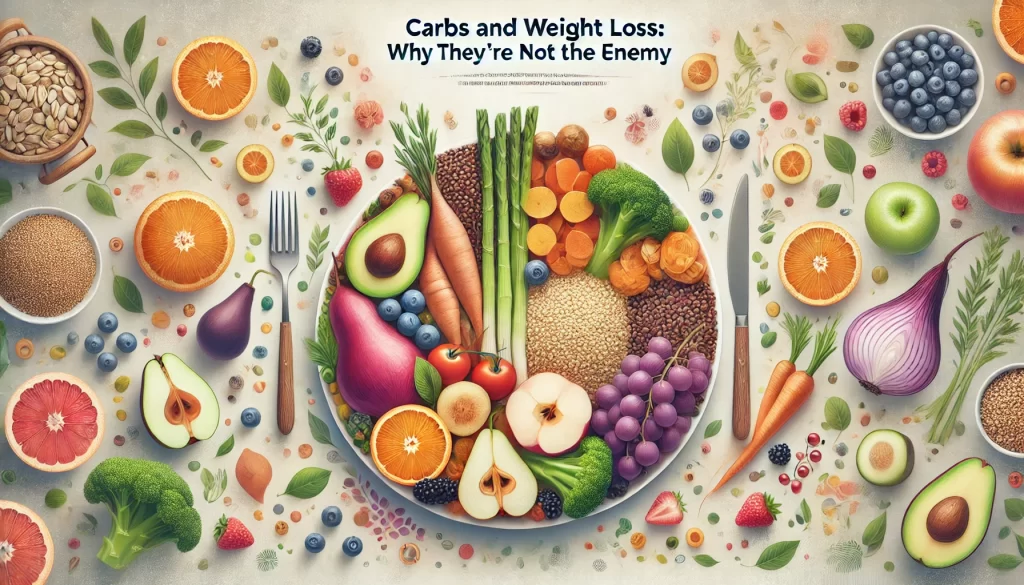
Carbs and Weight Loss: Why They’re Not the Enemy
When it comes to weight loss, one of the most common myths is that carbs are bad for you. With low-carb diets like keto and Atkins gaining popularity, it’s easy to think that cutting them out entirely is the key to success. But here’s the truth: not all carbohydrates are created equal, and avoiding them completely can actually hold you back from achieving your long-term goals.
Let’s explore why this myth persists, how carbs impact your body, and how you can incorporate them into a balanced approach to weight loss—including with my Balanced Keto Blueprint, where we use strategies like carb cycling to support your metabolism and long-term health.
Why Do Carbs Have Such a Bad Reputation?
Carbs are often blamed for weight gain because they’re a quick source of energy. If you eat more than your body needs, they can be stored as fat. Processed options like sugary snacks and white bread don’t help—they spike your blood sugar, leading to energy crashes and cravings.
But the problem isn’t carbohydrates themselves—it’s the type and quality of the ones you eat. Whole, nutrient-dense carbohydrates are essential for energy, brain function, and overall health.
The Role of Carbs in Your Body
Carbohydrates serve as your body’s primary fuel source. Here’s why they’re so important:
- Energy: Your muscles and brain need glucose, which comes from carbohydrates, to function properly.
- Physical Activity: They provide the stamina and power you need for workouts and daily movement.
- Health Benefits: Whole-food sources like vegetables, fruits, and grains supply fiber, vitamins, and minerals essential for digestion and well-being.
Eliminating carbs entirely can lead to fatigue, brain fog, and even hormonal imbalances. Your body needs the right types in the right amounts to thrive.
The Difference Between Good and Bad Carbohydrates
Not all carbohydrates are created equal. The key is to focus on quality over quantity:
Healthy Carbohydrates:
- Whole grains (quinoa, brown rice, oats)
- Vegetables (sweet potatoes, broccoli, carrots)
- Fruits (berries, apples, oranges)
- Legumes (lentils, black beans, chickpeas)
These are rich in nutrients and fiber, digest slowly, and keep your blood sugar stable.
Unhealthy Carbohydrates:
- Sugary drinks and candy
- White bread, pastries, and refined grains
- Processed snacks (chips, crackers)
These provide quick energy but lack nutrients and can cause energy crashes and cravings.
Why Low-Carb Diets Aren’t Always the Answer
While low-carb diets like keto can lead to short-term weight loss, cutting carbs completely is not sustainable for most people. Over time, it can cause:
- Fatigue: Without carbs, your body struggles to fuel workouts and daily activities.
- Cravings and Binges: Deprivation often leads to overeating later.
- Nutrient Deficiencies: Whole carbohydrates provide essential vitamins and minerals.
That’s why I teach a more balanced approach to low-carb eating in my Balanced Keto Blueprint.

A Smarter Approach: Balanced Keto Blueprint
If you want to lose weight, balance your hormones, and feel your best without completely cutting out carbohydrates, the Balanced Keto Blueprint is for you.
This program isn’t about deprivation. Instead, it focuses on:
- Starting Low-Carb the Right Way: We prioritize healthy fats, quality proteins, and non-starchy vegetables to jumpstart your results.
- Carb Cycling When It’s Time: As your metabolism improves, we reintroduce healthy carbohydrates strategically to fuel your workouts, balance hormones, and support sustainable weight loss.
How to Include Carbs Without Derailing Your Goals
Here’s how to make carbohydrates work for you, not against you:
- Choose Nutrient-Dense Options: Focus on whole grains, fruits, and vegetables that provide fiber and nutrients.
- Pair Them with Protein and Healthy Fats: This helps slow digestion, stabilize blood sugar, and keep you full longer.
- Watch Your Portions: Even healthy carbs can stall progress if you eat too much.
- Time Them Strategically: Eat carbohydrates around workouts or earlier in the day when your body needs energy the most.
Final Thoughts
Carbohydrates aren’t the enemy—they’re a vital part of a balanced diet. The key is learning how to include them in a way that supports your body, fuels your energy, and aligns with your weight loss goals.
With the Balanced Keto Blueprint, you’ll learn how to lose weight, feel amazing, and make carbohydrates work for you—not against you.
✨ Join the program today and discover how to do keto smarter, not harder.
Let’s leave the outdated myths behind and embrace a balanced approach to health and wellness!
Related Posts
Why Online Weight Loss Programs Could Be Harming Your Health
Understanding the Link Between Chronic Pain and High Blood Pressure
How to Stop Emotional Eating at Night: 3 Steps to Regain Control
Strengthening Your Immune System Naturally
Hair Loss? Let’s Look at Your Thyroid, Liver, and Protein
Why Root Cause Management Is Worth It
Tasty Tips for Healthy Holidays
Stay Healthy (and Sane) During the Holidays
